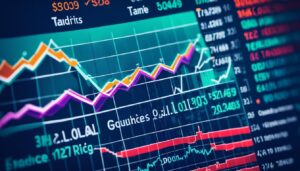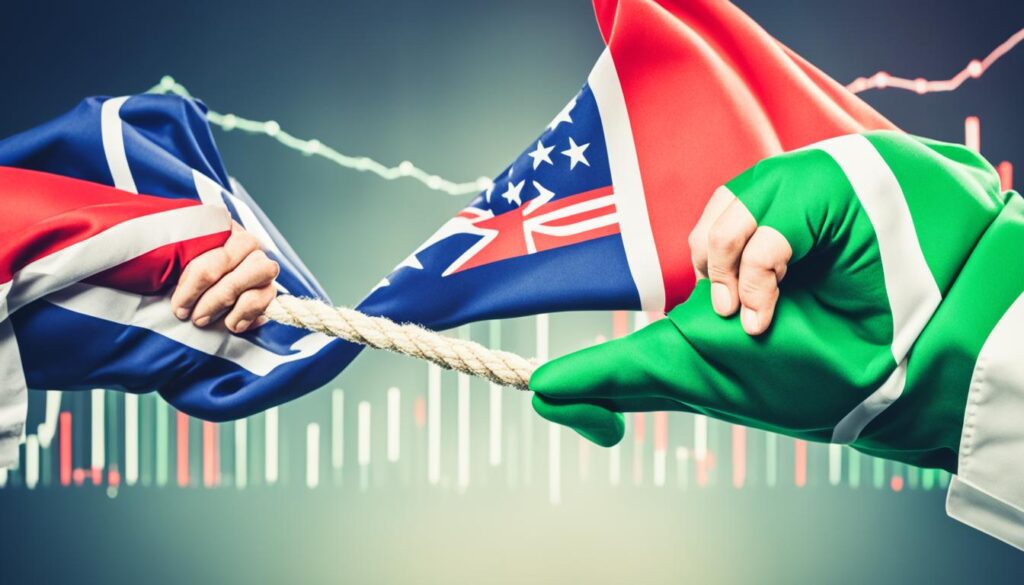Trade wars are a big deal in the world’s economy. They matter a lot to investors. The fight between the United States and China has made trading prices and investments unpredictable. It’s important for investors to keep up and understand how trade wars might affect them.
The recent agreement between the US and China has eased tensions for now. But it hasn’t solved the deeper problems. Issues like forced technology transfer and intellectual property rights are still up in the air. This means we’re not sure when a full deal will happen.
Investors need to be smart and spread out their investments to lower risks. The possibility of new tariffs and ongoing tensions can upset the market. By staying informed and ready to adjust, investors can better handle these uncertain times.
Key Takeaways:
- Trade wars can have a significant impact on global trading prices and investments.
- The recent trade accord between the US and China does not guarantee a comprehensive resolution.
- Investors should remain cautious and diversify their portfolios to mitigate risks.
- Ongoing trade tensions can create market volatility, affecting investment performance.
- Staying informed and adapting to changing market conditions is essential for investors.
What Is a Trade War?
A trade war happens when a country puts high tariffs on another’s imports. This is often a result of wanting to protect local jobs and businesses from overseas competition. This approach is known as protectionism.
Some people support trade wars because they think it can help local businesses. By using tariffs, a country can guard its industries from foreign rivals. This action can help save jobs and boost the economy.
On the other hand, many argue trade wars have bad outcomes. They believe such wars hurt local companies and consumers, making goods pricier. This can lead to less choice and less global trade.
“Trade wars can have detrimental effects on global trade and economic growth.”
Trade wars can mess up supply chains and threaten global stability. As nations act to protect their markets, it can cause a cycle of retaliation. This may harm international relations.
The Impact on Global Trade and Economic Growth
Trade wars can shake up global trade and slow down growth. They can make it hard for goods and services to move around. This might increase costs for businesses and make them less competitive.
They also scare investors and make markets unpredictable. The fear about trade policies can stop people from investing. This can lead to slower economic growth.
Take the trade fight between the US and China as an example. Both have set tariffs on each other’s goods. This raises prices and lowers exports. It impacts not just their economies, but the whole world’s.
Countries need to think hard about the pros and cons of trade wars. They should aim to solve disputes through talks and agreements. Working together can foster global stability and growth.
In a nutshell, trade wars come from trying to protect local industries. While some see benefits, others view the outcomes as harmful. These wars can disrupt trade, create economic risks, and slow growth. Seeking peaceful solutions and sustainable trade practices is key.
Global economic growth is peaking and vulnerable to a trade war
Today’s world is fully connected, and global economic growth is at its highest. Yet, it now faces a big threat from a trade war. Countries are using tariffs to protect their own interests, seriously impacting the global economy.
The US starting a trade war could really hurt the global economy as more tariffs are used. Countries that use tariffs and those that face them would lose economically. This would slow down global trade, reduce investments, and lead to job losses.
A big issue with trade wars is how they mess up prices and stop specialization. Tariffs make imported goods cost more, raising prices for consumers. This messes up the supply chain and makes international trade inefficient, hurting economic growth. Economies that relied on trading with others could see big and lasting losses.
The chance of a full-blown trade war is growing. It’s very important for countries like the US and China to come to an agreement. If trade tensions keep increasing, it could start a cycle of retaliation with long-lasting bad effects on the global economy. Global economic growth, a key factor for stability and prosperity, is at risk because of protectionism and ongoing trade disputes.
A trade war also impacts monetary policies and financial markets. Governments and central banks might have to change their policies to lessen the trade war’s effects on their economies. Financial markets could also become more volatile as investors worry about the future.
To show what could happen to global economic growth because of a trade war, look at this table:
| Country | Projected GDP Growth (%) | Impact of Trade War |
|---|---|---|
| United States | 2.5 | Decreased exports, job losses |
| China | 6.2 | Reduced investments, economic slowdown |
| European Union | 1.8 | Lower exports, weaker economic growth |
| Japan | 0.8 | Decreased demand, limited economic expansion |
The table shows how a trade war can deeply impact major economies. Reduced exports, job losses, less investment, and slowing economies are some results. These will not only hurt these countries but also affect others around the world, leading to a global slowdown.
We must find a way to solve trade disputes without making things worse. Countries and international groups need to work together and focus on negotiating. By supporting open and fair trade, we can keep the global economy stable and growing for everyone’s benefit.
Conclusion
Trade wars deeply affect global economic growth. The fight between the United States and China threatens both their economies and the world’s. Even with short breaks and early deals, the core problems and doubts stay.
Investors need to be careful and spread out their investments to lessen trade war effects. The unsure nature of trade wars can change investments over time. So, it’s important for investors to think about ways to protect their money.
The future of a real trade deal and an end to trade tensions is unclear. Countries in trade fights must solve their key issues for the good of all. Until that happens, investors should keep up with global trade news closely.
FAQ
What is a trade war?
What are the advantages of a trade war?
What are the disadvantages of a trade war?
How do trade wars impact global trade and economic growth?
What are the risks posed by the current trade war between the US and China?
How should investors approach trade volatility?
What should countries like the US and China do to resolve the trade war?
How do trade wars impact investments?
What are the consequences of a trade war on global economic growth?
Source Links
- https://www.investopedia.com/terms/t/trade-war.asp
- https://www.spglobal.com/marketintelligence/en/mi/solutions/us-china-trade-war-impacts.html
- https://www.linkedin.com/pulse/what-investors-need-know-us-china-trade-accord-kristina-hooper
Disclaimer
All information on this website is of a general nature. The information is not adapted to conditions that are specific to your person or entity. The information provided can not be considered as personal, professional or legal advice or investment advice to the user.
This website and all information is intended for educational purposes only and does not give financial advice. Signal Mastermind Signals is not a service to provide legal and financial advice; any information provided here is only the personal opinion of the author (not advice or financial advice in any sense, and in the sense of any act, ordinance or law of any country) and must not be used for financial activities. Signal Mastermind Signals does not offer, operate or provide financial, brokerage, commercial or investment services and is not a financial advisor. Rather, Signal Mastermind Signals is an educational site and a platform for exchanging Forex information. Whenever information is disclosed, whether express or implied, about profit or revenue, it is not a guarantee. No method or trading system ensures that it will generate a profit, so always remember that trade can lead to a loss. Trading responsibility, whether resulting in profits or losses, is yours and you must agree not to hold Signal Mastermind Signals or other information providers that are responsible in any way whatsoever. The use of the system means that the user accepts Disclaimer and Terms of Use.
Signal Mastermind Signals is not represented as a registered investment consultant or brokerage dealer nor offers to buy or sell any of the financial instruments mentioned in the service offered.
While Signal Mastermind Signals believes that the content provided is accurate, there are no explicit or implied warranties of accuracy. The information provided is believed to be reliable; Signal Mastermind Signals does not guarantee the accuracy or completeness of the information provided. Third parties refer to Signal Mastermind Signals to provide technology and information if a third party fails, and then there is a risk that the information may be delayed or not delivered at all.
All information and comments contained on this website, including but not limited to, opinions, analyzes, news, prices, research, and general, do not constitute investment advice or an invitation to buy or sell any type of instrument. Signal Mastermind Signals assumes no responsibility for any loss or damage that may result, directly or indirectly, from the use or dependence on such information.
All information contained on this web site is a personal opinion or belief of the author. None of these data is a recommendation or financial advice in any sense, also within the meaning of any commercial act or law. Writers, publishers and affiliates of Signal Mastermind Signals are not responsible for your trading in any way.
The information and opinions contained in the site are provided for information only and for educational reasons, should never be considered as direct or indirect advice to open a trading account and / or invest money in Forex trading with any Forex company . Signal Mastermind Signals assumes no responsibility for any decisions taken by the user to create a merchant account with any of the brokers listed on this website. Anyone who decides to set up a trading account or use the services, free of charge or paid, to any of the Broker companies mentioned on this website, bears full responsibility for their actions.
Any institution that offers a service and is listed on this website, including forex brokers, financial companies and other institutions, is present only for informational purposes. All ratings, ratings, banners, reviews, or other information found for any of the above-mentioned institutions are provided in a strictly objective manner and according to the best possible reflection of the materials on the official website of the company.
Forex/CFD trading is potentially high risk and may not be suitable for all investors. The high level of leverage can work both for and against traders. Before each Forex/CFD investment, you should carefully consider your goals, past experience and risk level. The opinions and data contained on this site should not be considered as suggestions or advice for the sale or purchase of currency or other instruments. Past results do not show or guarantee future results.
Neither Signal Mastermind Signals nor its affiliates ensure the accuracy of the content provided on this Site. You explicitly agree that viewing, visiting or using this website is at your own risk.




